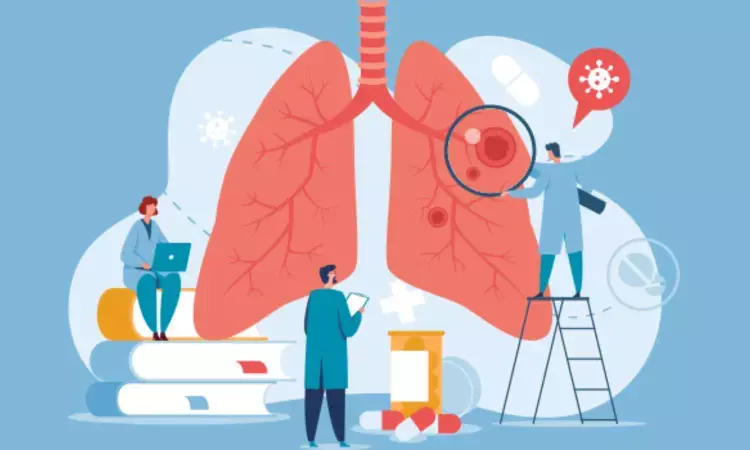- Home
- Medical news & Guidelines
- Anesthesiology
- Cardiology and CTVS
- Critical Care
- Dentistry
- Dermatology
- Diabetes and Endocrinology
- ENT
- Gastroenterology
- Medicine
- Nephrology
- Neurology
- Obstretics-Gynaecology
- Oncology
- Ophthalmology
- Orthopaedics
- Pediatrics-Neonatology
- Psychiatry
- Pulmonology
- Radiology
- Surgery
- Urology
- Laboratory Medicine
- Diet
- Nursing
- Paramedical
- Physiotherapy
- Health news
- Fact Check
- Bone Health Fact Check
- Brain Health Fact Check
- Cancer Related Fact Check
- Child Care Fact Check
- Dental and oral health fact check
- Diabetes and metabolic health fact check
- Diet and Nutrition Fact Check
- Eye and ENT Care Fact Check
- Fitness fact check
- Gut health fact check
- Heart health fact check
- Kidney health fact check
- Medical education fact check
- Men's health fact check
- Respiratory fact check
- Skin and hair care fact check
- Vaccine and Immunization fact check
- Women's health fact check
- AYUSH
- State News
- Andaman and Nicobar Islands
- Andhra Pradesh
- Arunachal Pradesh
- Assam
- Bihar
- Chandigarh
- Chattisgarh
- Dadra and Nagar Haveli
- Daman and Diu
- Delhi
- Goa
- Gujarat
- Haryana
- Himachal Pradesh
- Jammu & Kashmir
- Jharkhand
- Karnataka
- Kerala
- Ladakh
- Lakshadweep
- Madhya Pradesh
- Maharashtra
- Manipur
- Meghalaya
- Mizoram
- Nagaland
- Odisha
- Puducherry
- Punjab
- Rajasthan
- Sikkim
- Tamil Nadu
- Telangana
- Tripura
- Uttar Pradesh
- Uttrakhand
- West Bengal
- Medical Education
- Industry
Patients taking muscle relaxants at elevated risk of COPD exacerbation, unravels research

A new study published in the Chest Journal found that individuals using methocarbamol or cyclobenzaprine were more likely to experience exacerbations of their chronic obstructive pulmonary disease (COPD). In accordance with recent data, using gabapentinoids (pregabalin and gabapentin) may increase the frequency and severity of exacerbations of chronic obstructive pulmonary disease. Therefore, Irakli Lemonjava and her colleagues set out to look into any possible links between exacerbations of COPD and regularly prescribed muscle relaxants like methocarbamol and cyclobenzaprine.
The patients over the age of 18 who were diagnosed with COPD after January 1, 2000 were included in the study. They were divided into two groups where Group A consisted of patients taking either methocarbamol or cyclobenzaprine, and Group B consisted of patients not taking either of these drugs. This study focused on COPD exacerbations that occurred 1, 3, and 5 years after the index event and were classified by the international classification of diseases code J44.1.
The first day that a patient met all the chosen criteria, such as receiving a diagnosis of COPD and starting a medicine of interest, was considered the index event for that patient. Analysis did not include patients whose results occurred prior to the study timeframe. In order to account for demographic factors and ten different organ system illnesses, including the ones affecting the cardiovascular and pulmonary systems, the study used propensity score matching. Following propensity score matching, there were 399,886 people in Group A and 429,743 people in Group B.
COPD exacerbation occurred in 21,922 (5.482%) of Group A patients at 1-year follow-up, while it occurred in 21,513 (5.006%) of Group B patients, representing a 9.5% relative risk increase. At 3- and 5-year follow-ups, the risk gradually rose to 17.6% and 20.2%, respectively. At the 1-, 3-, and 5-year follow-up periods, the relative risk increase for COPD exacerbations was 9.5%, 17.6%, and 20.2% for patients on cyclobenzaprine or methocarbamol, respectively.
The warning range for the use of central nervous system depressing medicines among patients with COPD is expanded by the possibility of an increased risk of exacerbation linked to the use of routinely prescribed muscle relaxant pharmaceuticals. Thereby, physicians should weigh the possible danger of exacerbating COPD against the purported therapeutic advantages of these muscle relaxants. Alternative forms of therapy have to be taken into account.
Reference:
LEMONJAVA, I., GUDUSHAURI, N., MARTINEZ MANZANO, J. M., & AZMAIPARASHVILI, Z. (2024). EXPLORING THE ASSOCIATION BETWEEN ELEVATED COPD EXACERBATION RISK AND COMMONLY PRESCRIBED MUSCLE RELAXANTS. In CHEST (Vol. 166, Issue 4, p. A4691). Elsevier BV. https://doi.org/10.1016/j.chest.2024.06.2827
Neuroscience Masters graduate
Jacinthlyn Sylvia, a Neuroscience Master's graduate from Chennai has worked extensively in deciphering the neurobiology of cognition and motor control in aging. She also has spread-out exposure to Neurosurgery from her Bachelor’s. She is currently involved in active Neuro-Oncology research. She is an upcoming neuroscientist with a fiery passion for writing. Her news cover at Medical Dialogues feature recent discoveries and updates from the healthcare and biomedical research fields. She can be reached at editorial@medicaldialogues.in
Dr Kamal Kant Kohli-MBBS, DTCD- a chest specialist with more than 30 years of practice and a flair for writing clinical articles, Dr Kamal Kant Kohli joined Medical Dialogues as a Chief Editor of Medical News. Besides writing articles, as an editor, he proofreads and verifies all the medical content published on Medical Dialogues including those coming from journals, studies,medical conferences,guidelines etc. Email: drkohli@medicaldialogues.in. Contact no. 011-43720751


